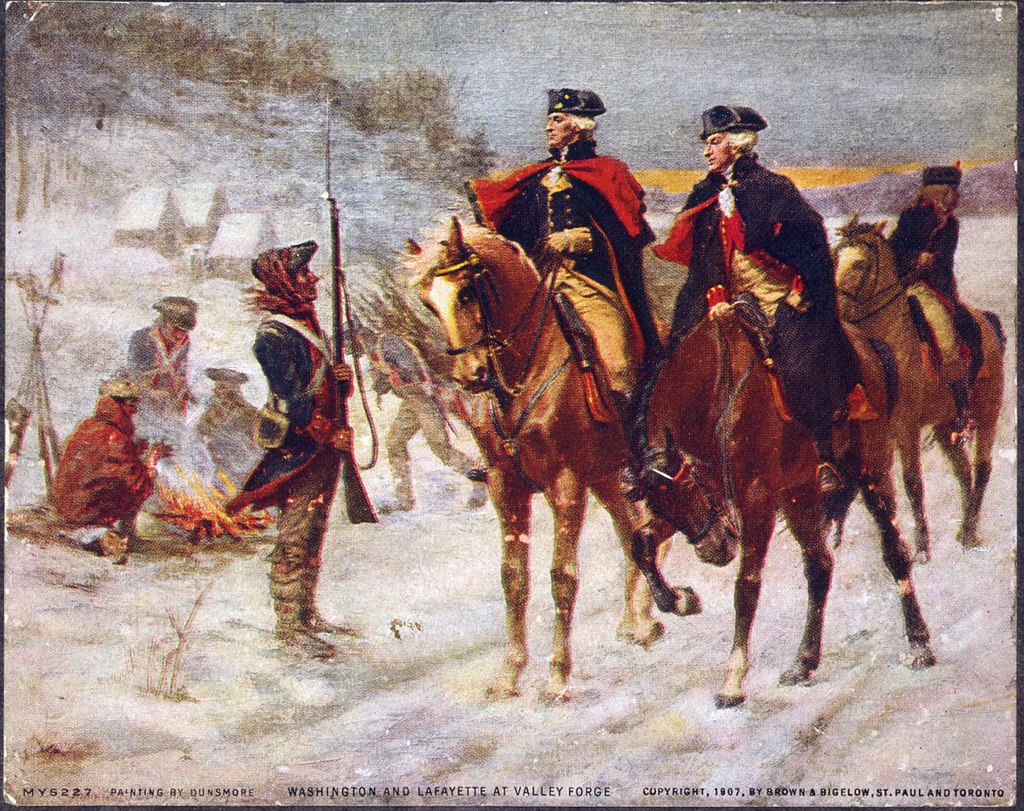War history centers on some of human history’s most renowned and respected generals, those who commanded domineering and revolutionary armies: Alexander the Great, George S. Patton, Genghis Khan, Napoleon Bonaparte, and George Washington to name a few. Legendary generals are marked by their extraordinary military strategy, ferocity, bravery, and of course, commanding presence. However, a trait in one commanding general stands out and separates him from others. We explain below.
George Washington and the Marquis de Lafayette at Valley Forge. By John Ward Dunsmore, 1907.
Continental Army Commander
Historians have frequently observed Washington’s dedication to American Independence which Washington admirably referred to as “our glorious cause.” He accepted the title as commander of the Continental Army without pay. Washington was one of the richest men in Virginia, if not the colonies. Had he wanted to, Washington would certainly have had the means to remain in the comfort and security at his home of Mount Vernon or toured the country Washington fought for during his service in the French and Indian War – Great Britain.
His leadership proved brilliant, especially in 1777-78 at Valley Forge during a bitterly cold winter. Of the 11,000 soldiers stationed at Valley Forge, hundreds would perish from disease. General Washington endured alongside his men. American military historian Edward G. Lengel describes his leadership during this “sacrificial” as he took “great care in seeing that his soldiers were well housed.”
While his leadership skills were exceptional, his military strategy was not. Alexander the Great is famous worldwide for his monumental empire, as he was never defeated in battle, and as he overpowered King Darius of Persia through deception. The Continental Army suffered more losses than victories under General Washington. However, the source of his triumph was his ability to rally supporters around “our glorious cause” through reminding them of their patriotic contributions. Washington understood the need to explain the “why” aspect of the fight for independence before addressing the “what” or “how” aspect. Washington was convinced, but not boastful.
David McCullough, author of John Adams, wrote that General Washington listened to the advice of his war council and messengers that reported to him which he used to avoid more catastrophic mistakes, proving that Washington continued to look after the lives and wellbeing of his men.
As a leader, Washington accomplished one of the most tremendous feats an under-trained and under-resourced ragtag militia could muster against a worldwide empire.
Political Office
On September 3, 1783, Great Britain formally acknowledged the independence of the United States with the signing of the Treaty of Paris, bringing the prolonged eight years of war to an end. At the moment of this monumental victory, Washington was at the peak of his power, a time at which most conquering generals in past human history would have appointed themselves as dictators. For example, not too many years after 1783, Napoleon Bonaparte led successful campaigns during France’s revolutionary wars and rendered himself emperor after the French monarchy was overthrown.
When the war ended, King George III asked his envoys about Washington’s activities. He was told Washington retired from public life, back at his home of Mount Vernon. George III couldn’t believe it; he leaned back in his chair and said, “If this be true, then George Washington must be the greatest Man in the world.”
After five years of comfort as a Virginian farmer, Washington once again recognized the need of the people for a leader to guide the nation in its infancy. The veteran general would serve his country as the first president of the United States from 1789-1797. He dressed in civilian clothes despite being encouraged to wear his military uniform as he felt it would resemble a military dictatorship – at the time much of Europe was, or was soon to be, under such rulers. He rebuked the title of “His Majesty,” simply preferring to be called “Mr. President.” Only serving two terms in office, Washington recognized that position was more impactful than his name and he would set an example for future presidents. In his farewell address, Washington utilized his language to humanize himself as a reminder that he is flawed and vulnerable like everyone else, yet devoted to building a nation future generations could thrive in.
At the end of his presidency, Washington told his friends and colleagues, “Gentlemen, if you wish to speak to me again, it will be under my own Fig and Vine.”
What do you think of George Washington? Let us know below.







